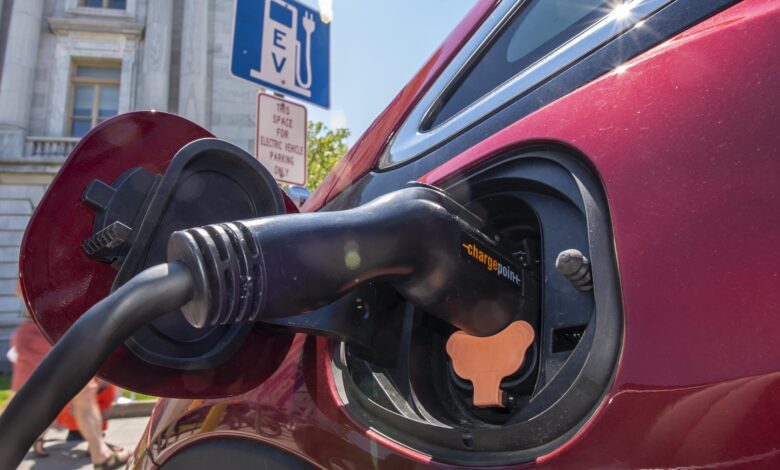Phil Scott signs annual transportation bill with new fees on electric vehicles

A new annual fee on electric vehicle drivers is slated to take effect next year after Vermont Gov. Phil Scott on Monday signed this year’s annual transportation funding bill into law.
The law, H.868, primarily allocates nearly $880 million to the state’s transportation system, according to Scott’s office. That includes about $130 million for roadway paving and some $55 million for public transportation. There’s also about $15 million for better bicycle and pedestrian infrastructure, as well as for stormwater management projects.
But the legislation also includes a grab-bag of policy changes, among them the EV fee that lawmakers hope will help make up for a drop in state transportation revenues that’s attributable to the fact electric vehicle drivers don’t pay the state tax on gasoline.
Starting in January 2025, electric vehicle drivers will be charged an annual fee equal to the amount they pay for their state vehicle registration — $98. Drivers with plug-in hybrids, meanwhile, will pay half as much. (Certain drivers could have the fee covered by a state electric vehicle incentive in the first year after they buy their car.)
Revenue from the fee will be directed to the state’s transportation fund for use building out electric vehicle charging equipment at business and multifamily housing units. Lawmakers have said that convenient access to chargers is the single greatest barrier to electric vehicle adoption for people in many Vermont communities.
While the fee has support from the state Agency of Transportation, it faced opposition this year from some lawmakers and environmental organizations, who argued that putting any additional costs on electric vehicles would disincentivize people from purchasing them when the state wants to see more on the roads.
The new fee is slated to remain in effect only until the state sets up a different kind of vehicle charge: an annual fee based on how many miles one drives. The state plans to have this “mileage-based user fee” in place once at least 15% of new cars sold in Vermont are electric.
But it’s not clear exactly when the state will hit that threshold. Right now, about 10% of all new cars in Vermont are fully electric, according to dealership data. And lawmakers have noted it could be years, regardless, before the mileage-based fee is ready to roll out statewide.
Still, “Vermont will continue to contend with transportation funding shortfalls due to decreased motor fuel tax revenue, on both gasoline and diesel, due to increasing vehicle fuel efficiency and the continued adoption of plug-in electric vehicles,” the legislation states.
Another solution lawmakers discussed this year for raising revenue — and reducing carbon emissions from the state’s transportation sector, which is the largest source of such pollution in the state — is the possibility of Vermont joining a regional cap-and-trade program. The state had planned to join a pact called the Transportation and Climate Initiative Program in 2021, but pulled back when other states reneged.
The program would work by setting a limit for transportation-related carbon emissions in the state. Fuel suppliers would purchase emissions allowances at auction, based on the amount of fuel they would sell. The cap would decline over time, and state officials would put the funds toward green transportation infrastructure.
H.868 calls for several state agencies to study the feasibility of joining such a program and to explore “other potential revenue-raising, carbon pollution reduction strategies.”
Another study mandated in the law will look at whether it’s feasible to expand passenger rail service in the state — specifically on Amtrak’s Vermonter train, which currently runs once a day in each direction between St. Albans and Washington, D.C.
H.868 also includes additional funding to expand high-speed electric vehicle charging infrastructure across the state, as well as funding for new park and ride infrastructure in Manchester and Sharon.
Schools and libraries
In addition to the transportation bill, Scott signed eight other bills into law Monday.
They include H.871, which creates a working group to hash out plans for restarting the state’s school construction aid program, including how the program should be funded and how officials should prioritize funding. The law also creates a facilities master plan grant program, which would help supervisory unions plan for their facilities’ futures.
Scott also signed S.220, a bill that protects library patrons ages 12 and up from having their library records disclosed to parents or guardians against their will. Currently, those protections apply only to those 16 and older.
S.220 also requires public libraries — and school boards — to establish procedures for reviewing potential objections to the materials in their collections. Such policies, for schools, would have to prevent book removals stemming from an objector’s political or religious views, among other measures.
Some lawmakers have connected the latter to book bans that have been reported nationwide and which, they said, are fueled by culture wars.



